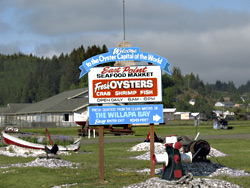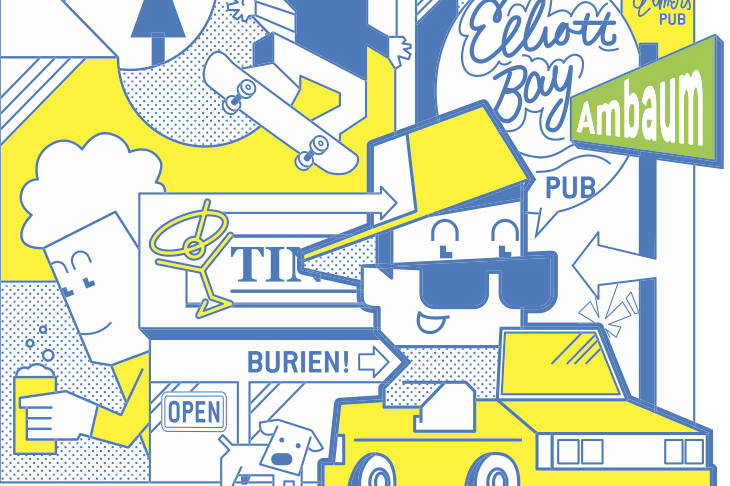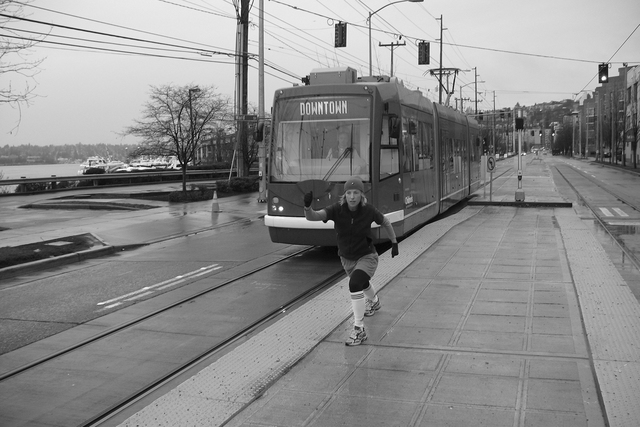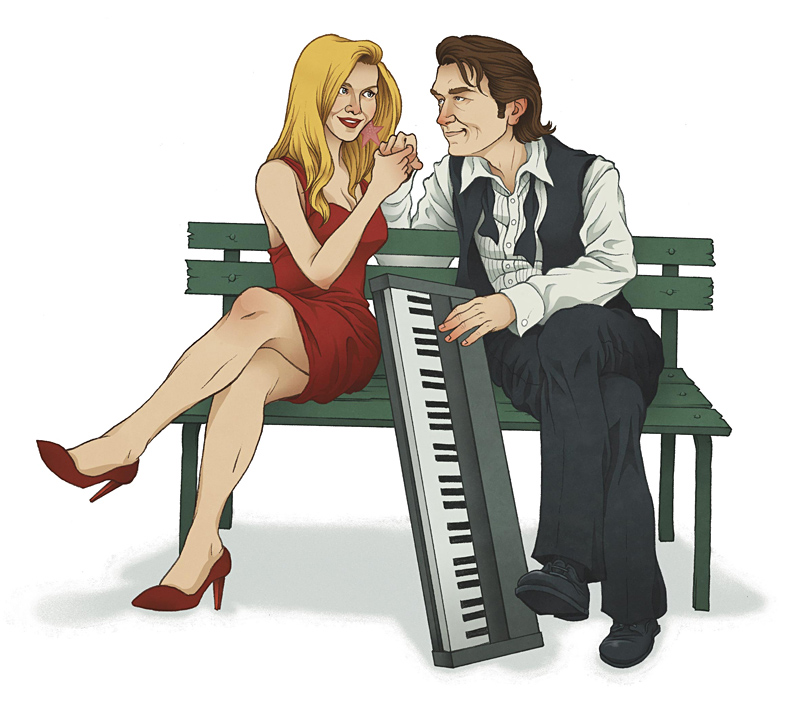Ask a Washingtonian where South Bend is, and she’ll likely point you in the direction of Indiana, where a college student dressed up as a leprechaun dances on the 50-yard-line a half-dozen Saturdays a year. What she’ll be highly unlikely to do is point you 126 miles south on 101, to Washington’s clandestine Cranberry Coast—best known for being the home of the chilliest surfing scene in the lower 48, and least known for being the home of South Bend, Washington, aka “the oyster capital of the world.”
People who do know of South Bend’s existence know it as the place they stop for gas or a quick bite en route to Long Beach or Ocean Shores. While South Bend has a shoreline, it’s a river shore (the Willapa)—albeit a river shore very near the mouth of the Pacific Ocean. Downtown, there’s a bowling alley, a grocery store, a service station, a bar, a historic courthouse, a couple antique shops, a couple motels, a couple restaurants, and more than a couple mountains of oyster shells.
North of South Bend is the larger town of Raymond, where Weyerhaeuser is the dominant employer and logging is still the dominant industry. In South Bend and all points south, the timber trade gives way to an economy that ebbs and flows with the whims of the sea and its slippery, edible occupants.
But what if you were to stop in South Bend—to spend a night instead of an hour? What would that be like? It would be the essence of vacation, distilled to its very core—and leaving you a lot more money left over than a rum-drenched trip to Grand Cayman.
Consider the human practice of extended leisure time, and consider it at a fiscal level a good depth below that of a go-go software exec. What do Joe and Jane Six-Pack want out of their time away from life’s little pressures? For starters, they’ll want a six-pack—several of them, actually; and they might want a shot of stiffer stuff every third beer to keep things interesting. They’ll want their cooking done for them, but not necessarily with a linen tablecloth and proper cutlery. They’ll want their room cleaned for them every morning, and they won’t want to pay an arm and a leg for that room. And they’ll want all this to occur in an idyllic, pristine setting that’s worlds removed from home—in a psychological, if not geographic, sense.
South Bend and its blink-and-you’ll-miss-it neighbor to the south, Bay Center, offer all these elements. A de facto view condominium with its own front porch and entrance can be rented from the proprietors of the a Motel for a mere $80 per night. A couple blocks away sits the Chester Club, a vintage, biker-friendly roadhouse with enormous, fresh-caught oyster shooters and cheap dispensations of mescal. As the sun sets at the Chester, workaday amnesia sets in; it’s just you, whoever you care to talk to, and the bar.
A similar sensation can be found at the Mt. Si Tavern near North Bend (with Washington’s two Bends, you’ve got to wonder why the best-known Bend is in Oregon). Visible from I-90, the Mt. Si Tavern looks like just another place to pull off the interstate and grab a quick beer. In fact, nothing could be further from the truth.
Stepping into the Mt. Si Tavern is like stepping into a beer commercial, and not just because of the shed out back with a pair of skis mounted atop it and a Budweiser sign nearby. Inside, the tavern has a log-cabin feel, with booths hand-carved from what was undoubtedly timber harvested from nearby forests. The bartender is super-friendly— especially if you order Pabst—and there’s a pedestrian speed bump of sorts near the bathrooms that’s liable to trip you up if you don’t know it’s there.
But, wow, the backyard—so unexpected. Oh, sure, there are a few tables on a patio nestled up against the tavern’s rear wall, but there are also two horseshoe pits, the aforementioned ski shack, a flower-ringed evergreen tree sticking out of an impeccably manicured lawn, and majestic Mt. Si rising high into the sky. This blue-collar country club makes you forget entirely that one of the country’s busiest interstates is only a few yards away.
A mile or so down the road is downtown North Bend, instantly evocative of the greatest dramatic network television series of all time, David Lynch’s Twin Peaks. The Double-R Diner is actually a place called Twede’s Cafe, but the streetscape has been preserved to the point where you half expect to get stopped by Sheriff Harry S. Truman himself and asked if you know who killed Laura Palmer.
Up the street from a throwback Dairy Freeze on North Bend Way is a small bar called the Sure Shot. Here, the pool-hustling focus is made clear on its marquee, which includes an 8-Ball—thus making it the perfect place for the fictitious Renault brothers to hand off product to Twin Peaks‘ network of small-time coke dealers.
Heading back to the coast, it’s impossible to consider the full breadth of South Bend’s appeal without a jaunt to Bay Center. Here, aside from a handful of small waterfront fish-processing operations, sits a bar called the Dock of the Bay— “the only going concern in Bay Center,” in the words of the Seaquest’s matronly owner.
By early afternoon, a small group of affable clam-diggers is already four beers into their Saturday drinking quest (these guys get up at 3 a.m., so it may as well be happy hour). The conversational rudder in this group is a guy named Kenny, who’s arguing with his fellow diggers over who wrote the Bible. Mathematicians, says one guy. Nobody, says a Big-Bang believer. “A troll under a bridge,” says another. “We’re all descendants of Sasquatch, not monkeys,” concludes Kenny, who insists he’s heard a Sasquatch in the woods nearby, and knows exactly what one sounds like. (It should also be noted that both the fried halibut and oysters at Dock of the Bay are easily the most succulent this writer has ever consumed.)
In the late ’60s, with the Vietnam War being fought with full fervor, author Tom Robbins (currently based in La Conner) moved from Ballard to South Bend, where he wrote his debut novel, Another Roadside Attraction. Of the natives who hung ’round the house he shared with his girlfriend at the time, Robbins says: “They were great kids—very smart despite limited exposure to things cultural or intellectual. There was a tavern, all right, but it was almost exclusively frequented by morose loggers and mill workers, who dropped in to get beered up before going home to beat their wives.”
When out-of-town friends would drop in on Robbins, he would quickly escort them to Bay Center. “There was a funky place there called the Penguin Inn, which, in addition to a somewhat more cheerful clientele, would sell you a huge platter of broken oyster pieces, nicely fried, for a dollar,” he recalls. “The beer was cold, and you had the feeling of being far removed from turbulent America.”
If you were to sum up vacation in an oyster shell, that’d be about right.
For more info, visit www.visit.willapabay.org and http://ci.north-bend.wa.us.








